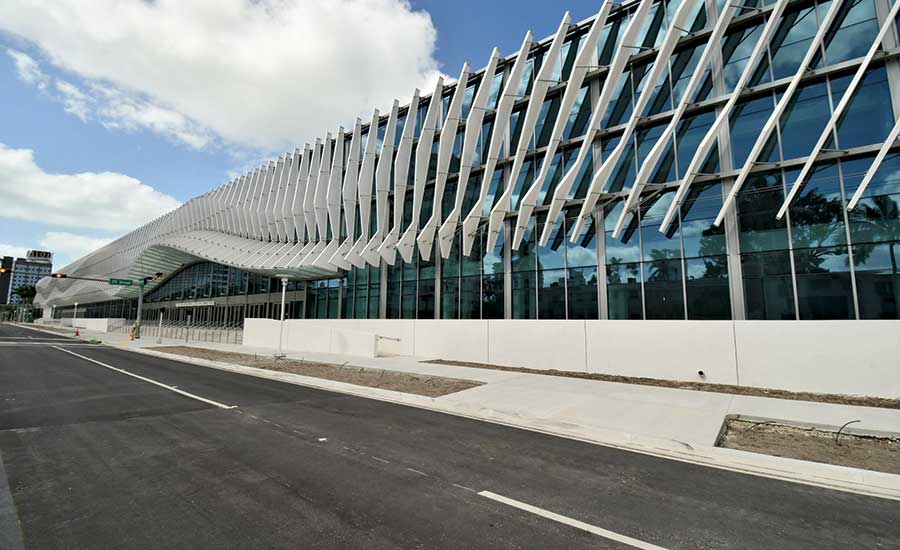After working through a bumpy procurement for its estimated $515-million convention center renovation and expansion contract, the city of Miami Beach is now battling what it claims to be a surprise lawsuit from contractor Clark Construction Group seeking more than $70 million in damages on the still-unfinished project.
In addition to alleging “constant design changes” and “mismanagement of the design process,” Clark’s suit asserts that the city and its program manager, Hill International, took “unreasonable positions” throughout construction, refusing to pay for changes, to grant time extensions or compensate Clark for delays caused by Hurricane Irma.
The lawsuit, filed in state circuit court in Miami, also claims the city is withholding millions of dollars owed to the contractor and its subcontractors.
The lawsuit, filed in state circuit court in Miami, also claims the city is withholding millions of dollars owed to the contractor and its subcontractors.
The convention center has been operating for special events since 2017 via the city’s use of special permits combined with the stationing of firefighters throughout the building. That approach was used during the city’s Super Bowl Experience event this past week.
In a Jan. 31 memo to the Miami Beach mayor and commissioners, city manager Jimmy Morales stated that Clark’s filing included “a number of unfounded allegations” and “falsehoods,” adding that “no one from Clark gave any advance notice that a lawsuit would be filed.”
Clark’s action might have been anticipated, though. On July 8, 2019, the city served notice to the contractor that it was “in default of its contractual and other obligations.” The city alleged 23 “additional defaults” by the contractor, and provided 15 days for Clark to “promptly commence and thereafter complete the curing of the defaults.”
That notice of default from Miami Beach came shortly after Clark’s June 10, 2019, notification to the city that the project was substantially complete and that the contractor “had satisfied the requirements for a temporary certificate of occupancy,” according to the city’s notice of default.
In its Jan. 29 legal filing in Miami-Dade circuit court, Clark argues that the company “did its job, such that the City is currently reaping the benefits of its state-of-the-art convention center.”
Rocky Construction
Together, Clark’s lawsuit and the city’s rebuttal reveal that the construction period never smoothed out after the bumpy procurement. Originally targeted for substantial completion by June 30, 2018, the city says the project is still incomplete.
Clark alleges that the city, and Hill, “failed to conduct proper design reviews prior to issuing design-related documents to Clark.” The contractor states that the city has approved approximately $78 million in changes to the work, while still disputing “over $70 million in additional costs for damages and other impacts.”
The contractor continues that, along with its subcontractors, the company performed the work as directed despite the fact that the city “refused to provide compensation for the additional costs of the extra work.”
During the project’s initial procurement, concerns about budget caused three of four bidders to withdraw from consideration, leaving only Clark. However, during that initial bidding process, Clark declined to deliver the project outlined in the criteria package due to inconsistencies between scope and budget compared with comparable projects, Rick Yezzi, Clark’s project executive, told ENR in 2018.
The city responded by shifting to a construction management at-risk delivery to keep the project progressing.
Once again, though, only Clark submitted a bid. Despite receiving just the one bid, Maria Hernandez, the city ‘s project director, told ENR in 2018 that the second round of bidding showed that “the fees and general conditions were similar to that of other convention center projects.”
Despite having only 65% construction documents, in October 2015, the city and Clark executed a GMP Amendment with a GMP of nearly $515.5 million, setting June 30, 2018, as the target date for substantial completion.
Yezzi also told ENR in 2018 that despite the fact that “many assumptions had to be made by both the designers and the construction manager” during that period, “it was decided to start construction prior to the design being complete.”
Completion Dispute
When Clark notified the city that the project was substantially complete as of June 2019—though it still lacked a temporary certificate of occupancy—the contractor asked for the project architect, Fentress Architects, to be prompted to perform substantial completion inspections.
On July 8, 2019, Fentress Architects reported back to the city that Clark had not achieved substantial completion, noting, for instance, that of 12,334 substantial completion inspection items, only 1,607 had been resolved by the construction manager.
Moreover, Fentress informed the city: “Several items on the substantial completion inspection list constitute significantly incomplete work that would not typically be permitted to reside on a substantial completion punch list,” such as incomplete lighting and electrical work, and incomplete life safety systems.
Clark, on the other hand, maintains that the city made numerous design changes after the owner and contractor reached an agreement in early 2017 on a GMP reconciliation change order (RCO) that, among other things, revised the substantial completion date to Aug. 8, 2018. Clark asserts that the RCO was “premised on the express representation by the city that the ‘construction documents are now the approved completed construction documents.'"
Nevertheless, wrote Morales in his Jan. 31 memo to city leaders: “Clark has a lot of nerve to file this lawsuit. As we sit here today, nearly seven months after Clark was placed in default, Clark has still not delivered a building that is ‘substantially complete’ nor achieved a temporary certificate of occupancy.”
Clark’s Jan. 29 statement noted that the contractor’s lawsuit was a necessary step “so that Clark and its subcontractors can finally be paid for their hard work.”
Hill International has not responded to ENR’s request for comment.


